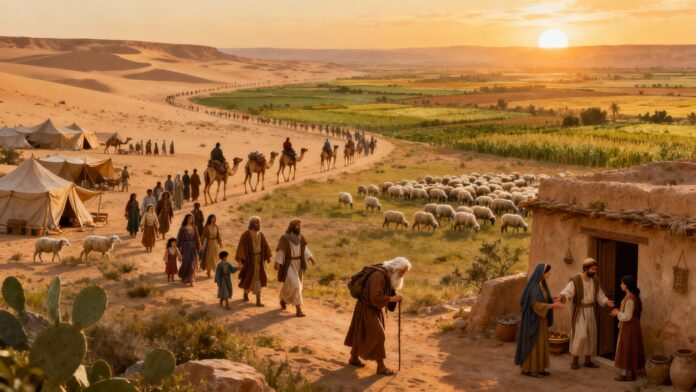In a world where population movements dominate the news, the millennia-old stories of Scripture offer surprisingly modern wisdom on the art of welcoming and the challenges of integration.
Far from being mere historical anecdotes, the biblical migrations They reveal universal truths about the human condition. These ancient texts speak directly to the burning questions facing our societies: how do we welcome the stranger? What does hospitality truly mean? How do we build an inclusive community while preserving our identity?
This spiritual perspective on contemporary issues invites us to rediscover profound teachings, often neglected in our current debates. Biblical figures, in their forced or chosen journeys, show us that migration has been an integral part of the human experience since the dawn of time.
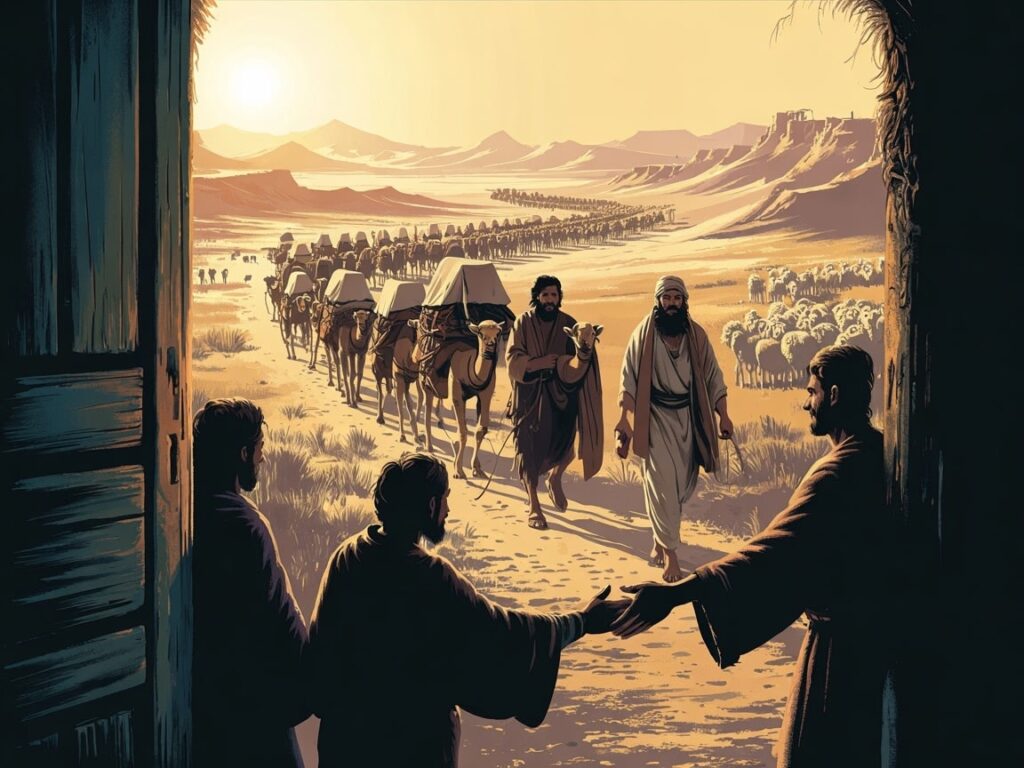
The deep roots of human movement
From the very first pages of Scripture, movement defines humanity. This committed spirituality teaches us that leaving and welcoming are two sides of the same existential reality.
Abraham leaving Ur represents far more than a geographical displacement. His departure illustrates the universal quest for a better future, this fundamental aspiration that still drives millions of people to cross borders today. His story reminds us that behind every migration lies a promise, a hope, a vision of a more fulfilling life.
This spiritual dimension of departure transforms our understanding of contemporary migrations. Rather than seeing only statistics or logistical problems, we can recognize in each migratory journey a search for meaning, a legitimate aspiration for happiness and security.
The motivations of biblical migrations reveal timeless human constants. The search for a promised land is not merely geographical; it expresses a deep desire to find one's place in the world. This quest resonates particularly strongly in our era of uncertainty and transformation.
The spiritual dimension of exile
The exile of the Hebrew people in Egypt illustrates how circumstances can transform a chosen migration into a forced one. This gradual transformation, from a welcoming reception to oppression, offers essential insights for our time.
THE sacred texts current events They reveal that successful integration largely depends on the evolution of attitudes in the host society. When fear replaces trust, when the other becomes a threat rather than an asset, relationships gradually deteriorate.
This dynamic challenges us today. How can we maintain a genuine attitude of welcome in the face of the real challenges of integration? Scripture suggests that the answer lies in preserving our common humanity, beyond cultural or religious differences.
The Biblical Art of Hospitality
L'Christian hospitality It goes far beyond mere social conventions to become a fundamental existential principle. Biblical narratives abound with examples where welcoming the stranger reveals the true character of individuals and communities.
Imagine the scene: a weary traveler knocks on your door. Does your reaction reveal your true nature? This situation, omnipresent in Scripture, confronts us with our own attitudes toward the unknown and the different.
Biblical tradition teaches that the stranger often carries within him a hidden blessing. This perspective radically transforms our approach to contemporary migration. Instead of seeing only the challenges, we can seek opportunities for mutual growth and cultural enrichment.
This vision of hospitality as a source of blessing invites us to rethink our policies on welcoming newcomers. How can our communities become spaces where strangers find not only refuge, but also the opportunity to contribute to the common good?
Host communities: challenges and opportunities
The reactions of biblical communities to newcomers reveal behavioral patterns that remain relevant today. The oscillation between mistrust and benevolence, between closed-mindedness and openness, characterizes human interactions throughout the centuries.
This modern reading of the Bible This helps us understand that successful integration requires a two-way effort. Newcomers must show their desire to integrate, while host communities must demonstrate openness and patience.
The scriptures teach us that diversity enriches communities when it is accompanied by shared values and mutual respect. This ancient wisdom offers practical guidance for navigating the complexities of our multicultural societies.
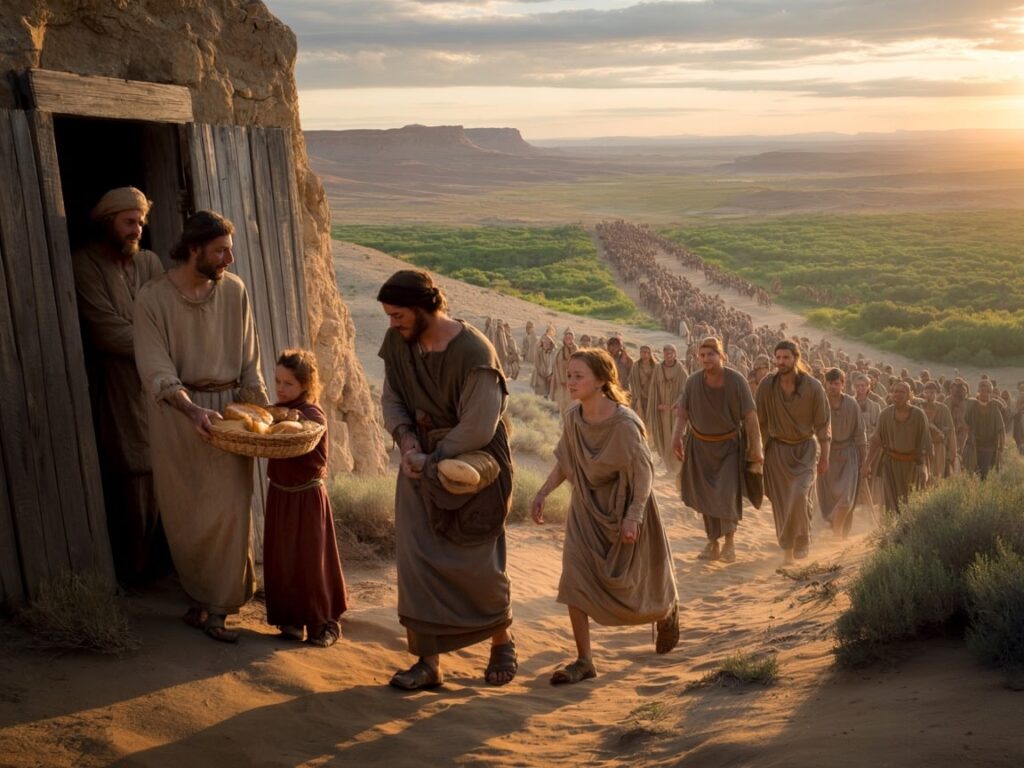
Deep motivations: beyond appearances
Understanding the true motivations behind biblical migrations helps us better understand contemporary movements. Fleeing persecution, seeking better living conditions, and the spiritual quest motivated the figures of Scripture as much as our contemporaries.
This faith and contemporary society Dialogue reveals that behind every departure lie legitimate hopes and fundamental needs. Recognizing this shared humanity becomes the first step towards a genuine and constructive welcome.
Migrations for spiritual reasons, so prevalent in the Bible, remind us that the yearning for the transcendent can lead people to cross borders. This dimension, often overlooked in contemporary debates, nevertheless deserves our attention, for it reveals profound motivations that go beyond mere economic calculation.
The Quest for the Promised Land
The concept of a "Promised Land" transcends geographical boundaries to express the universal aspiration for a place where one can fully flourish. This powerful metaphor helps us understand that every migrant carries within them this hope for a better future.
Picture this scenario: you must leave everything familiar behind for an uncertain future, guided only by the hope of a better life. This situation, experienced by Abraham and so many other biblical figures, resonates with the experience of millions of our contemporaries.
This perspective invites us to see in each migratory journey an epic dimension, a human adventure worthy of respect and support. Instead of reducing these journeys to problems to be solved, we can recognize in them legitimate quests for dignity and fulfillment.
Practical lessons for our time
Transposing biblical teachings on hospitality into our contemporary context requires discernment and creativity. sacred texts They offer us timeless principles that we must adapt to our modern realities.
Biblical hospitality begins with the recognition of our shared humanity. This fundamental basis allows us to move beyond superficial divisions and build genuine bridges. In our communities today, this can translate into concrete initiatives of welcome and integration.
The Scriptures also teach us the importance of patience in the processes of integration. Profound transformations take time, and impatience can undermine sincere efforts. This biblical lesson reminds us that building an inclusive society requires perseverance and compassion.
Living one's faith in a world in motion
How can we concretely live out the values of biblical hospitality in our complex societies? This practical question deserves in-depth reflection that goes beyond pious generalities to touch on everyday realities.
There faith community It can become a laboratory for social experimentation where new forms of welcoming and integration are tested. Religious communities, with their strong tradition of hospitality, can set an example by creating spaces for meeting and dialogue.
This practical approach to spirituality invites us to move beyond mere contemplation and engage concretely with the challenges of our time. Biblical teachings on hospitality thus take on a prophetic dimension that challenges our consciences and our actions.
Imagine if every faith community became a bridge between cultures, a space where the stranger finds both welcome and recognition of their dignity and talents. This transformative vision could revolutionize our approach to contemporary migration.
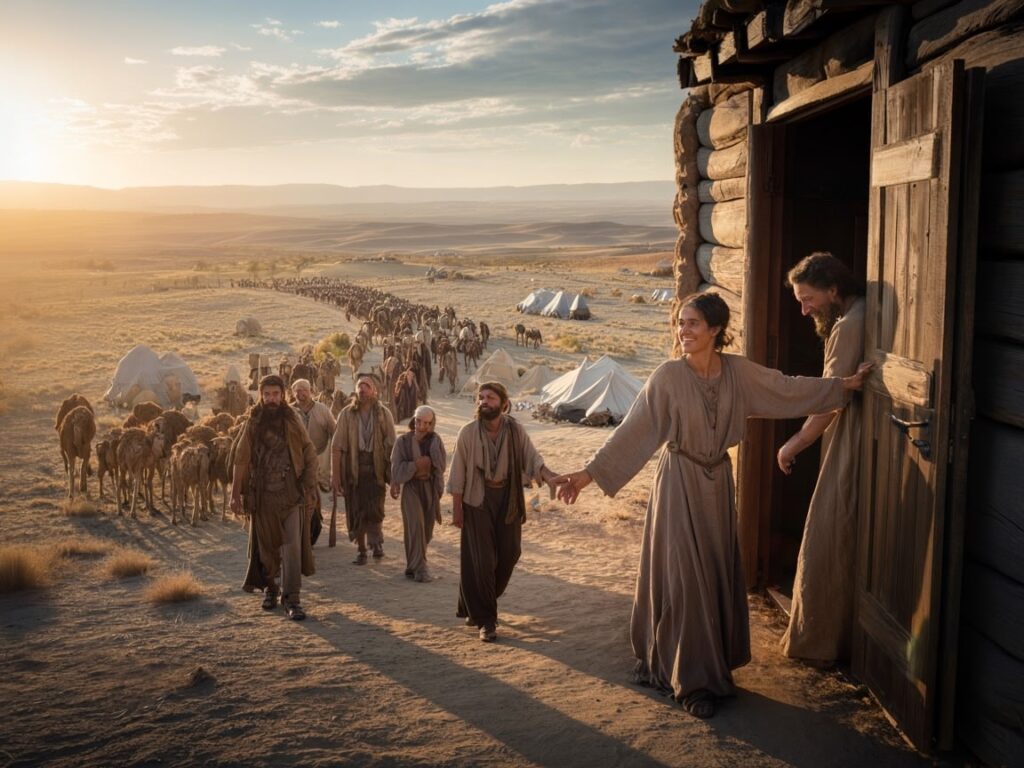
Our responsibility towards foreigners
The Scriptures do not simply invite us to hospitality; they remind us of our fundamental responsibility towards those who come from outside. This ethical dimension transcends practical considerations to touch upon the very essence of our humanity.
This responsibility stems from the recognition that we have all, at one time or another, been strangers seeking welcome and understanding. This memory of our own vulnerability makes us more sensitive to the needs of others and more generous in our responses.
Biblical tradition teaches us that neglecting the stranger diminishes ourselves. This ancient wisdom reveals that genuine hospitality enriches both the giver and the receiver. This fundamental reciprocity transforms the act of welcoming into a source of mutual growth.
Build bridges, not walls
Faced with contemporary migration challenges, biblical teachings resolutely guide us toward building bridges rather than walls. This constructive approach acknowledges the real difficulties while rejecting simplistic or exclusionary solutions.
Building bridges requires courage, creativity, and perseverance. It involves overcoming our legitimate fears to discover the opportunities hidden in every intercultural encounter. This demanding process helps us grow as human beings.
Communities that choose this path often discover that welcoming the stranger revitalizes their own dynamism. This biblical lesson finds concrete echoes in many contemporary experiences of successful integration.
The eternal relevance of Scripture
The capacity of biblical migrations Its ability to shed light on our contemporary challenges demonstrates the eternal relevance of Scripture. These ancient texts speak to our time with surprising acuity, revealing universal truths about the human condition.
The enduring relevance of biblical teachings invites us to rediscover the richness of these texts beyond their purely religious dimension. They constitute a heritage of human wisdom that can nourish our reflections on current societal challenges.
Approaching migration through a biblical lens also offers us an alternative to purely economic or security-based discourses. It reintroduces ethical and spiritual dimensions into debates often impoverished by polarization.
This enriched perspective allows us to address migration issues with greater nuance and depth. Instead of simplistic solutions, we can seek holistic approaches that consider all dimensions of the human experience.
Strengthening community engagement
Lessons learned from biblical migrations They have the power to bring communities together around shared values. This unifying dimension can help strengthen the social fabric in our often fragmented societies.
When faith communities rediscover their vocation of hospitality, they usually regain their dynamism and sense of mission. This revitalization benefits society as a whole by creating spaces for dialogue and solidarity.
Community engagement in welcoming migrants can also foster interreligious and intercultural encounters. These exchanges enrich all stakeholders and contribute to building a more inclusive and harmonious society.
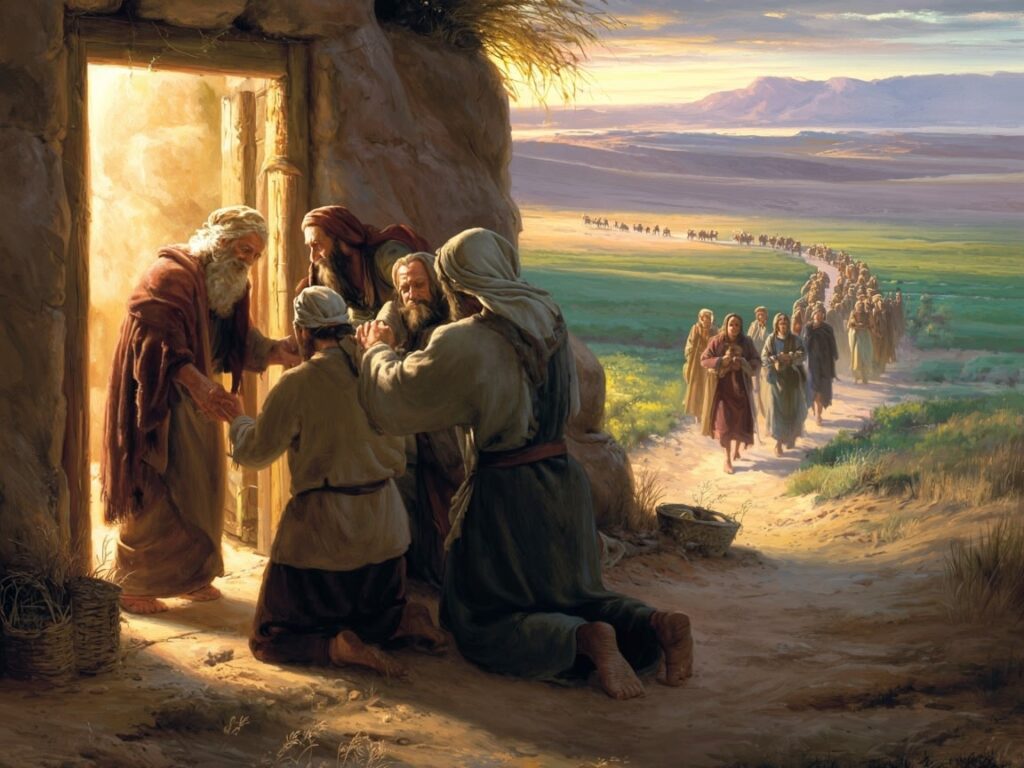
Towards a spirituality of welcome
The stories of biblical migrations They ultimately invite us to develop a true spirituality of welcome. This approach transforms our relationship with others and our understanding of ourselves.
This spirituality recognizes in every encounter with the stranger an opportunity for personal and communal growth. It teaches us to see beyond apparent differences to discover our common humanity and shared aspirations.
Cultivating this spirituality of welcome requires constant self-reflection. It involves overcoming our prejudices, fears, and protective reflexes to open ourselves to the richness of human diversity. This spiritual journey transforms us as much as it transforms our relationships with others.
In a world where population movements will continue to intensify, developing this capacity for genuine welcome becomes crucial for the future of our societies. Biblical teachings provide us with invaluable resources to meet this challenge with wisdom and generosity.
Rediscovering our common humanity
THE biblical migrations They remind us of a fundamental truth often forgotten in our contemporary debates: we are all travelers in search of meaning, security, and dignity. This recognition of our shared humanity paves the way for more constructive and compassionate approaches to migration issues.
These ancient stories teach us that genuine hospitality enriches both the giver and the receiver. This age-old wisdom can transform our understanding of contemporary migration and help us build more inclusive and supportive societies.
The scriptural invitation to see the stranger as a potential bringer of blessing challenges us to overcome our fears and defensive reflexes. This shift in perspective can revolutionize our policies of welcoming newcomers and our community practices.
How will you integrate these teachings into your own faith journey and civic engagement? The wealth of sacred texts It awaits us to nourish our thinking and guide our actions in a world in perpetual motion.
Take a moment to reflect on the strangers who have crossed your path. What have you learned from them? How have they enriched your life? This gratitude can become the starting point for a renewed commitment to hospitality and solidarity.

